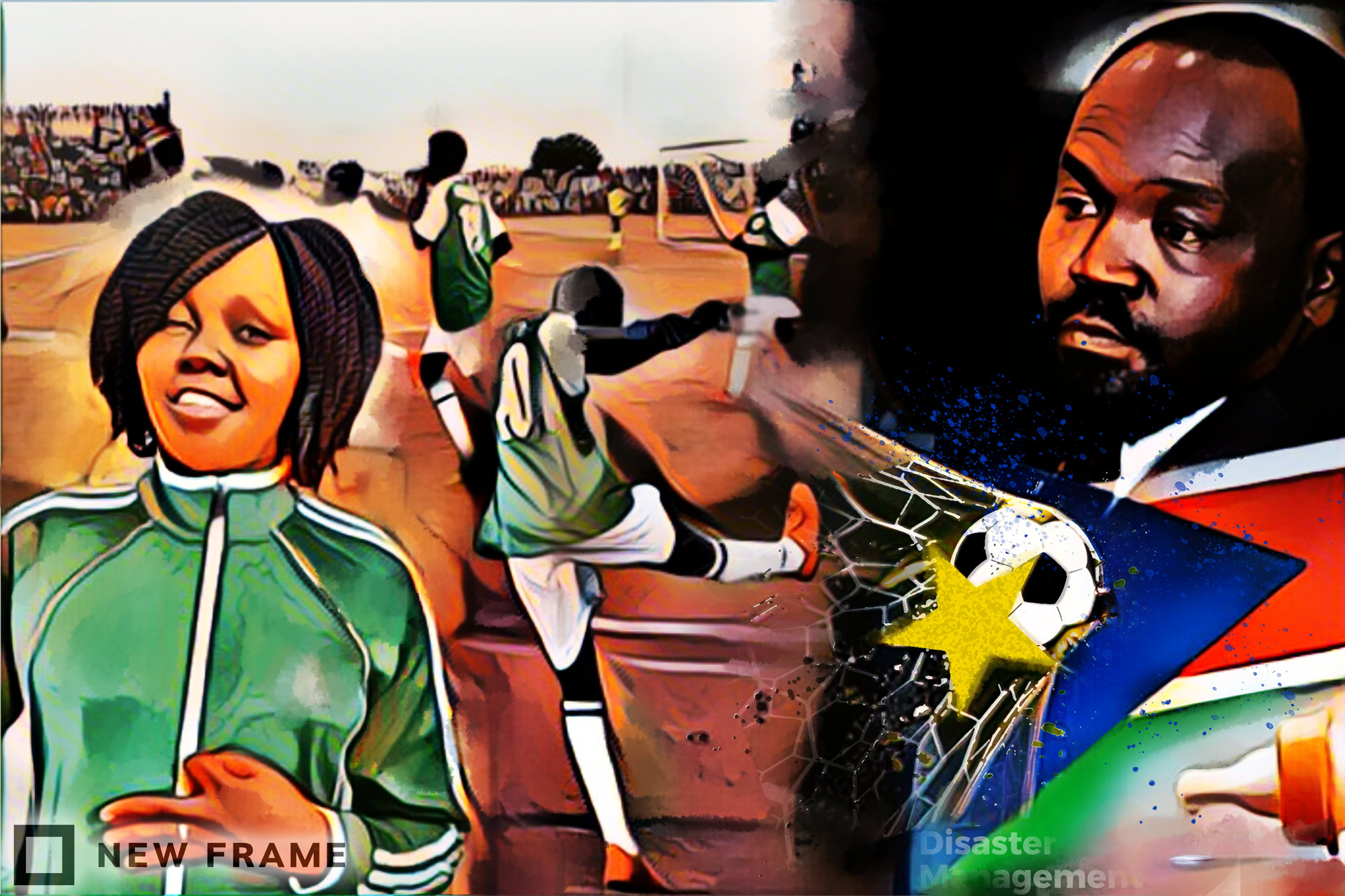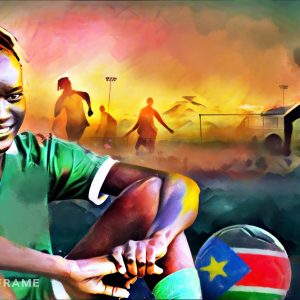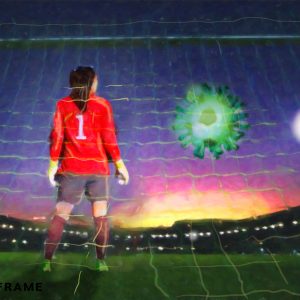Pitch invasion undermines South Sudan’s progress
Instead of celebrating the senior women’s national football team’s first participation in an international friendly, the country has had to hang its head in shame over the sexist and violent conduc…
Author:
18 May 2021

The shameful conduct of Peter Mayen Majongdit, South Sudan’s minister of humanitarian affairs and disaster management, has shown exactly why the country’s women’s football league is such an important milestone in the quest for gender equality. But it has also exposed the huge challenges that lie ahead for women players trying to reach for their dreams.
Majongdit stormed the playground in Aweil Freedom Square on 17 April and disrupted a national women’s league game between Aweil Women and Juba Super Stars. He came to forcefully get his wife, professional footballer Aluel Garang, 20, off the pitch in her first match since her return from maternity leave.
“Aluel [had] played just about five minutes,” said Aweil head coach Moses Zakaria Ngor. “Her husband came to the field and asked my assistant to remove Aluel. He told him that Aluel left their baby boy at home alone and he was crying. We said, ‘Okay … can you have a seat so that we can substitute Aluel for her to go home with you?’ He said, ‘No, I am not going to sit. It has to happen immediately. I need Aluel to come out.’”
It is unclear whether it was Majongdit or his bodyguards who then fired shots in the air, but the game was stopped temporarily and Garang left with her husband, after which it continued to a goalless draw.
Majongdit’s conduct angered and scared the players and the crowd, and it has provoked nationwide indignation and condemnation. It comes as the young country, where gender-based violence as well as child and forced marriages are rife, has been grabbing positive headlines globally for developing women’s football.
Related article:
The South Sudan Football Association (SSFA) launched the women’s league in February as part of a project called Stars Unite, which aims to build an inclusive and sustainable future for women and girls in the sport, while challenging deeply ingrained misogynistic sentiments in society in general.
“The honourable minister married this young lady while she was a player, so it’s very bad to prevent her from playing football,” said Dut Majokdit, a member of the main opposition party, the National Liberation Council. “All the citizens in the stadium were running away for their safety. This act must be addressed by the government.”
The SSFA expressed its disappointment and condemned the “transgression” by a popular and senior minister serving in the government. “The administration of SSFA will continue to stand strong and cooperate with the government to see our women being given [a] chance to play and exercise their talents freely with confidence,” the association said.
South Sudan’s Olympic Committee also condemned “in strongest terms such attitude, especially from a national minister, as sports is a bridge for social cohesion and peace-building”.
Majongdit’s actions have also raised concerns about players’ safety and shown that a lot of work needs to be done in changing mindsets and making football stadiums welcoming and safe spaces for women. “It wasn’t a good reaction from the minister,” lamented a Juba Super Stars player who spoke on condition of anonymity. “The organisers need to guarantee our safety, because if not, some parents may not accept their children to travel and play in the [different] states.”
Who is Aluel Garang?
Born on 12 June 2000, Garang started playing football at the age of 12 in Aweil, her hometown and the capital of the eponymous state. She has since settled with Tiger United FC, the club that nurtures her for state duties with Aweil Women, which she captains.
Nicknamed Aluel Messi, after the Argentinian great, Lionel Messi, her star shone brightest during the maiden National Women’s Cup organised in 2020 where she scored six of her club’s 11 goals in the tournament. She scored the lone goal that saw her state defeat Torit 1-0 in Wau to clinch the silverware, and picked up two prestigious accolades as the tournament’s top scorer and best player.
“Aluel ‘Messi’ is the best player in Aweil, our state,” said Ngor. This view is shared by many, including local football association agent Garang Peter Akech and former footballer John Ngong.
“Aweil is known for producing great football players in the men’s team, like Toni Aluk and Atak Lual. Aluel, on the other side, is seen as the female equivalent of Aluk and Atak,” Ngong said.
“Aluel’s absence is a big blow to her team. When she is in the field, her presence gives them confidence… When Aluel was absent in the games played by Aweil, the results weren’t great. But when she returned against Bentiu at home, Aweil scored three goals, eventually getting their first big win in the league.”
Related article:
Garang married Majongdit in 2020 while still 19. “Mayen spotted Aluel through her brilliant football skills during last year’s tournament,” said Ngong. “Mayen believed Aluel was a special character and he approached her family for her hand in marriage. Her parents agreed to Mayen’s proposal.
“Being pulled off the pitch is a strong indicator that the minister is a threat to his wife’s football career. However, Aluel’s husband promised on a local radio station that he will allow her back to the pitch once their son is six months [or older].”
Dimming the brightness
Majongdit’s conduct has undermined the tentative but positive steps that the country’s senior women’s national team took in the international arena in April. Taking part in their first Fifa friendly, South Sudan played against Ethiopia in Addis Ababa as part of their efforts to get a ranking from world football’s governing body.
They lost the first match 9-0 and the second one 3-0, but this has not discouraged the players. “I felt happy to be part of the team,” said defender Dorka Gerald. “I wish we can have more of these friendly matches so that we will improve. Even if we get beaten by other countries, we will not give up because we want to become a better and strong team of South Sudan.”
Gerald also pointed out how playing football was allowing her to stretch her wings. “First of all, playing football has made me tour so many places [in South Sudan] and now I’m crossing international borders. That is like a dream come true.”
Related article:
The 21-year-old’s football journey began in 2014 despite resistance from her uncle, who was against her and her sister’s involvement in the sport. “But now the story has changed. He freely lets us go and play football. This is always a big challenge to other girls too. Sometimes their families don’t allow them to play due to cultural norms and traditions,” said Gerald.
Bright Starlets’ captain Amy Lasu also took the losses in Ethiopia on the chin because she recognises the team’s journey as a work in progress. “We’ve had both negative and positive feedback from people back home,” she said. “I guess the ones who gave negative feedback don’t understand the fact that we’re still starting and we can’t reach the top that fast. For one to succeed, you have to start from down and grow gradually. We also had people supporting and encouraging us and that’s what has or will motivate us to do better.
“We are very optimistic that we are going to do great in future as a country. I mean, there is so much talent in South Sudan. It’s just that we lacked opportunities before. But now the opportunities are there and so many girls have started getting involved in the game. So, in a few years to come, I believe we will be a better team and we will be participating in bigger tournaments.”
Green shoots on the pitch
The double-header with Ethiopia was Shilene Booysen’s first assignment as the Bright Starlets’ coach. “Coach Shilene has brought something very special to us. She has so much knowledge on the game and analysis. She has been encouraging us, [she] believes in us,” said Lasu.
Booysen, a former Banyana Banyana performance analyst, is pleased with the foundation that is being laid. “These girls have an average age of 18 years and for them it was special to be able to travel outside the country and play. They were so proud to represent their country and I was even prouder of them,” she said.
“In five days we were able to put together a strategy. The [playing chemistry] will, of course, be a process that will take some time. But what I saw in the second game was a true reflection of the courage and intelligence these players have.
Related article:
“I think we need to do better in selecting opposition so that we don’t just think of a Fifa ranking, but also of the growth of the players while we try to get the ranking. I am currently putting together an individual training programme for each player to make sure they are better prepared [physically, tactically and mentally] when they come to the next camp.”
“I appreciate Coach Shilene because the current players were all selected from the ongoing SSFA women’s league,” said Gerald. “She treats us equally while we are in camp and even during the training. The equal treatment has had a positive impact because the players were able to interact freely with one another, which was not the case with the previous coaches… I thank Shilene for the great work done and for believing in us.”
Gerald’s words reflect how what would be small things for teams in other countries mean so much more in South Sudan, where female football players are breaking new ground for all girls and women.
But the success of the ambitious plans for women’s football don’t just rely on the players, the authorities that run the game and those in government need to step up too. Which makes it all the more disheartening that, so far, no punishment has been meted out to Majongdit, and neither has there been any condemnation from the ruling National Congress Party.




